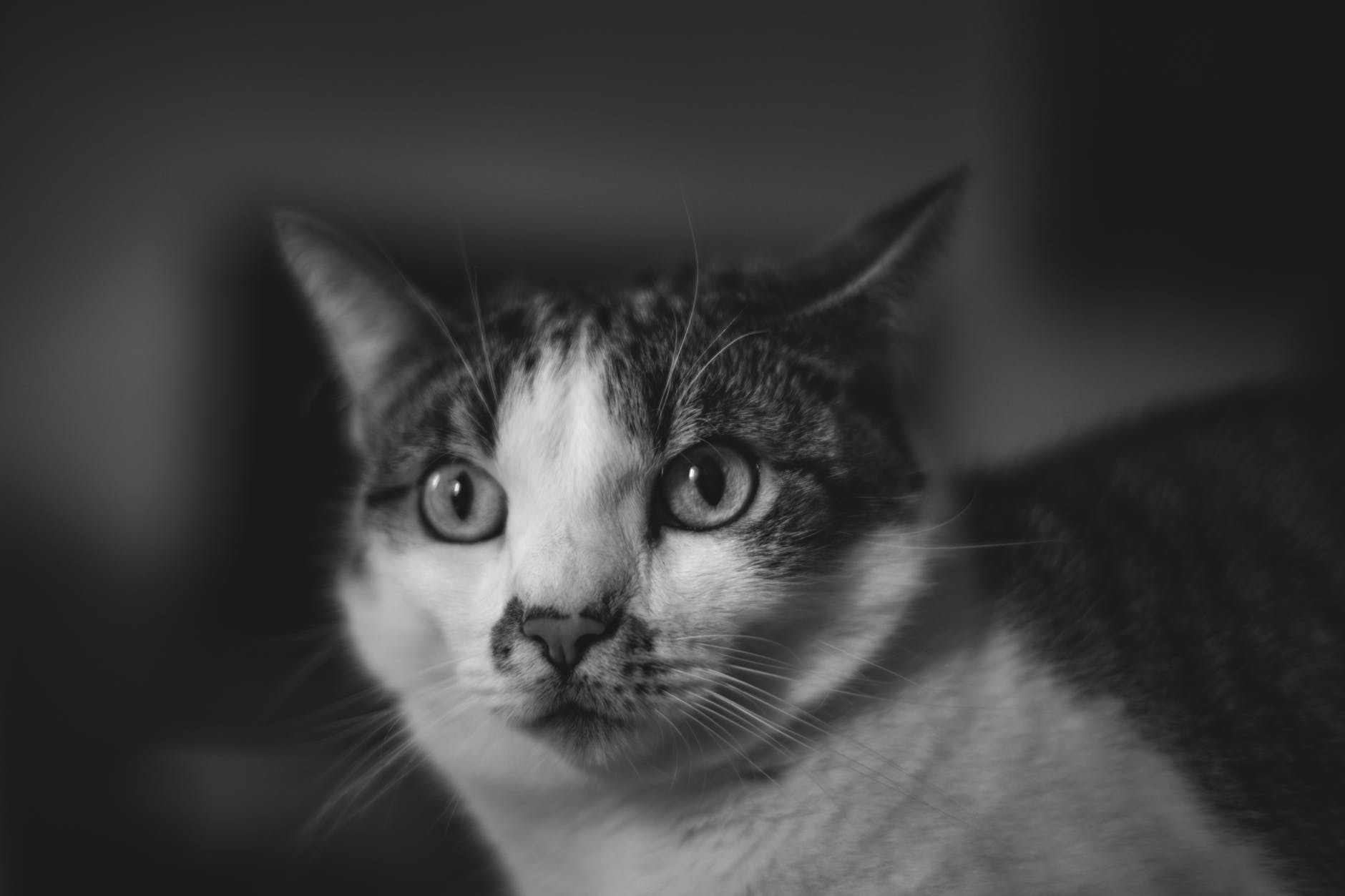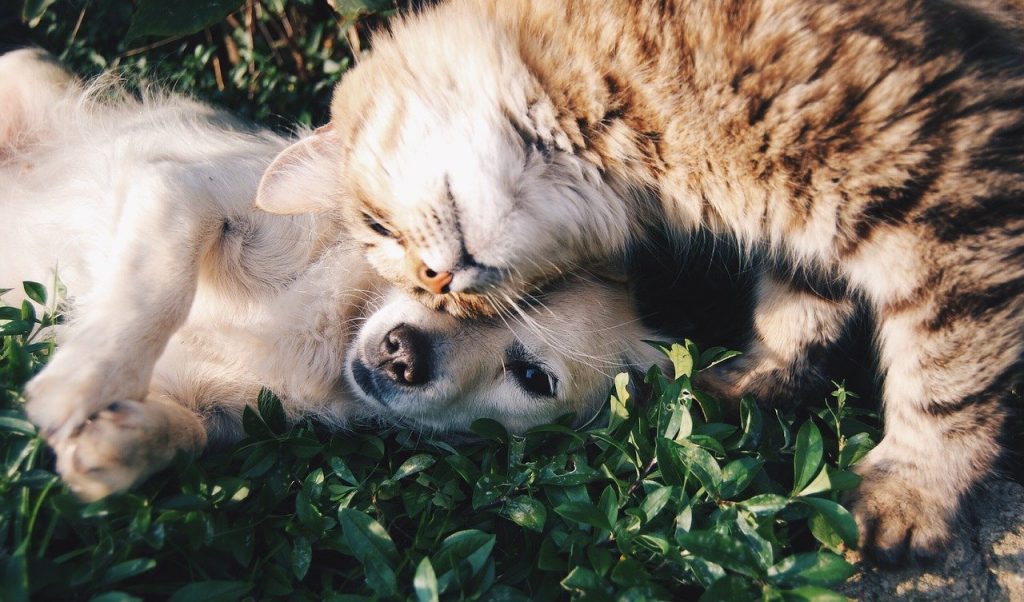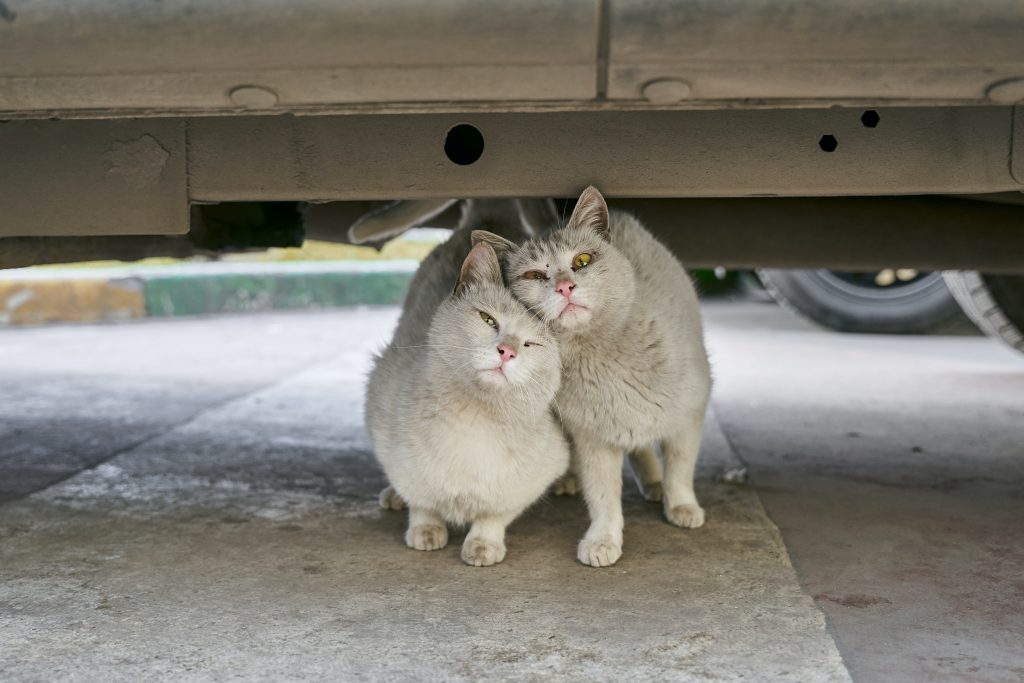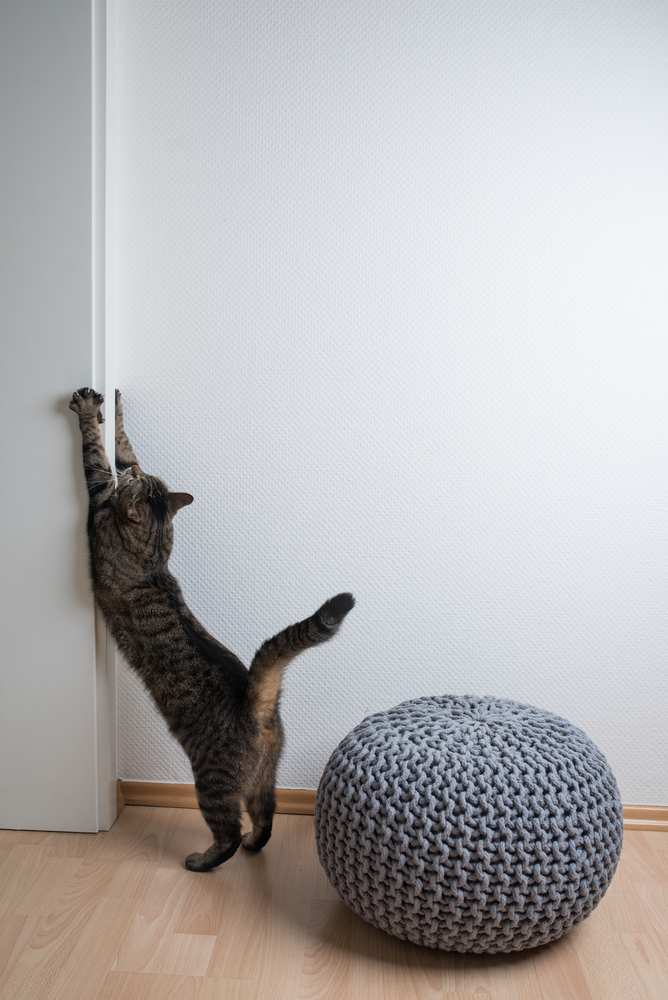My Cat is Scared of Something I Can’t See: 9 Ways to Help
Has your cat recently been weird? Like she can see something you can’t?
I have been wondering about the same question. My cat is scared of something I can’t see, but is it a ghost or something else?
Why Is My Cat Suddenly Skittish?
Do you have a scared cat? Does your kitty hide under the bed when she’s scared of something that you can’t see?
It might be time to try some of these tricks and strategies for helping her through this difficult period in her life. We’ll start with your first step: Try not to let yourself get frustrated or angry about it and get to the bottom of the fear.
Some reasons as to why your furry friend is scared include:
1. New smells
A new smell can cause a cat to react in a fearful or aggressive manner.
Cats are naturally cautious and may become scared or agitated when they encounter something new for the first time. This could be anything from a strange person or object, to a new type of food or smell.
Some smells can also trigger negative memories for cats, such as those associated with potential danger or illness. As a result, these smells may cause them to act out in fear.
The best way to prevent your cat from reacting negatively to new smells is to introduce them slowly and gradually over time. Take things one step at a time, and always be patient while trying new things out.
If you notice that your cat is reacting negatively to certain smells, it’s important to take measures to reduce their anxiety before it becomes too serious.
For example, try keeping different types of odors Away, and spraying around the house in case your cat starts reacting badly during scent-sensitive times such as when you’re cooking or cleaning.

2. Unfamiliar sounds
Unfamiliar sounds can be anything that your cat is not used to hearing. This could include things like vacuum cleaners or children playing in the backyard.
When cats hear unfamiliar sounds, they may become frightened and hide or try to escape the scene. This reaction can be dangerous for them since they may inadvertently run into traffic or hurt themselves in other ways.
If you’re worried about your cat’s safety, it’s important to monitor their behavior around unfamiliar noises.
3. Vibrations
When your cat sees or feels something that makes them scared, they will react by reacting to the vibrations.
For example, if your cat is laying on the bed and a loud noise comes from outside, they may start to tremble and hide under the bed in fear. This is because their senses are telling them that there is danger nearby and they need to protect themselves.
4. Sudden movements around them
Sudden movements around your cat can be frightening and may cause them to react in a scared or defensive manner. This might include hiding, crouching down, or making loud noises.
Your cat’s reaction to sudden movements is likely due to the fact that they are naturally fearful and reactive creatures. When something new or unexpected comes into their environment, they often respond by trying to hide or flee from it.
5. Strangers
Cats are naturally apprehensive around strangers, which is why it’s important to introduce new people or animals slowly and gradually. If your cat is scared of all strangers, you may need to consult a veterinarian about possible solutions.
There are a few things you can do to help ease your cat’s fears around unfamiliar people and animals:
Play gentle sounds (like meowing) in the vicinity of the stranger while they’re outside the house. This will help familiarize your cat with the sound and hopefully make them less scared when they see the stranger again.
Provide treats whenever a stranger comes over. This will show your cat that these visitors are friendly and won’t harm them.
Avoid using scents or bright colors around strangers. These might scare your cat and make him/her more afraid of everyone in general.
6. Animals
A study by Purina found that out of the top ten fears reported by cats, seven were related to animals they perceived as dangerous – including dogs.
While it’s not clear why cats are scared of dogs, it may have something to do with their evolutionary history. As predators, cats may remember the fear and anxiety they felt when fleeing from dangerous canines in the wild.
Alternatively, it’s possible that early exposure to domesticated dog breeds may have contributed to this fear.
Regardless of the reason, it’s important for cat owners to be aware of their feline friend’s phobia so they can keep their homes safe and secure from potential canine aggression.

7. Fear of new objects
Cats love familiarity and tend to reject any new things in their lives. Your cat may start being scared after it notices for example a piece of new furniture.
To deal with this, slowly introduce your pet to the new item slowly until your furry friend finally accepts the change.
8. Fear of physical discipline
Fear of physical discipline is the fear of being physically punished or scolded. This fear can be caused by a traumatic experience in the past, such as being physically disciplined by caregivers.
Remember as a kid how you were sometimes so scared of discipline that you’d go into a frenzy, unable to do even the simplest of tasks?
Well, it’s no different from your furry friends. Remember cats also have feelings and get scared too.
9. Your Cat Heard Something You Didn’t
Your cat may be scared of something you don’t know about. Sometimes, cats hear things we can’t. Keep in mind that cats have a heightened sense of hearing and may catch things the human ear can’t.
If you notice that your cat is behaving differently around certain noises or objects, it might be worth checking out what’s scaring them. You might also want to speak with a veterinarian about possible solutions.
What are some signs that my cat is scared?
Some signs that your cat is scared could include:
- Hiding
- Meowing often and softly
- Avoiding people.
What are some common things that cats are scared of?
Cats are naturally curious animals and can be scared of many different things. Some common things that cats are scared of include: dogs, other cats, loud noises, new environments (like moving), and strange smells.
Cats may also be afraid of being alone or left alone in a new place. If your cat is showing any signs of being scared or anxious around these situations, it might be best to take her to see a veterinarian for an evaluation.
Why is my cat scared of something I can’t see?
Cats have enhanced eyesight and can easily see things that we can’t. Keep in mind that felines are crepuscular, meaning they see better and in great detail at night.
According to this study, cats can see things on the ultra-violet light spectrum. This simply means that sometimes your furry bestie sees things that you’re incapable of seeing.
What can I do to help my cat if it is scared?
If your cat is scared, you can try to reassure it by talking to it calmly, offering a comfortable place to rest, or giving it a treat. You can also try playing with the cat and engaging in some playful activities.
What should I not do if my cat is scared?
Do not try to calm your cat with loud noises or physical contact. This will only make her scared and more likely to bolt.
Instead, try using calming methods like petting, feeding her favorite food, or playing with her until she feels safe again.
What are some long-term solutions for a scared cat?
Some long-term solutions for a scared cat are to provide reassurance and love, gradually introduce new people and animals into the home, or use a behavior modification technique such as desensitization.
How can I prevent my cat from getting scared in the first place?
Providing your cat with a safe environment will help prevent them from getting scared in the first place. This means providing them with things like toys, beds, and windows that can keep them occupied.
You can also teach your cat how to react calmly when they’re faced with danger by rewarding good behavior and punishing bad behavior.
How can I keep my cat calm and relaxed?
1. Identify the source of the trigger.
The first step to helping your cat relax is identifying the source of the trigger. This could be anything from a new person in the house to an upcoming event.
Once you know what’s causing your cat to become anxious, it’s easier to find solutions. For example, if a new person is moving into the house, it might be helpful to keep your cat separated from them until they’ve had a chance to get settled.
Alternatively, if there’s an upcoming event that causes anxiety in your cat, you can prepare them by providing them with some calming treats or toys beforehand.
2. Manage the situation calmly and patiently.
Next, manage the situation calmly and patiently. This means avoiding any sudden movements or loud noises that could further upset your cat.
Try speaking in a calm voice and using positive reinforcement – such as petting or giving them a favorite toy – to help pacify them.
By following these simple steps, you can help ease your cat’s anxiety and make their transition into their new surroundings smoother sailing.
3. If the cat is frightened, leave them alone.
Cats can get scared very easily, which can lead to problems like destructive behavior or even running away from home.
If you’re trying to help your cat and they’re being a bit too disruptive, it may be best to just leave them alone for now. They’ll eventually calm down on their own.

3. Keep your distance when the cat is being aggressive.
If your cat is being aggressive, it’s important to keep a safe distance from them. This will help to prevent them from attacking you or any other person in the house.
Signs of aggressiveness include hissing, spitting, or swiping at you.
4. Keep them fed and hydrated.
Keeping your cat fed and hydrated is important to their overall well-being. Cats usually eat twice a day, so it’s important to provide them with the correct food and water at the right times.
Cats need about 30-35% of their caloric intake in liquid form, so providing them with enough water throughout the day is essential.
If your cat doesn’t like drinking from a bowl, try putting kibble in a small cup and offering it to them as they would drink from a fountain.
Keep an eye on your cat’s weight – if they’re starting to become overweight or obese, it may be time to switch their diet or give them additional exercise.
5. Do not try and console them with too much affection or hugs.
The way you interact with your cat will have a significant impact on their stress levels.
If you try to console them with too much affection, they may associate being calmed down with being hugged or touched. This can lead to increased stress levels and frustration later on.
Instead, try gentle petting or speaking softly to them in a calm voice. This will help them relax and feel reassured.
When someone is stressed out, it can be difficult for them to cope emotionally and behaviorally. Cats are no different – when their stress levels are high, they may become agitated and resist calming techniques such as petting or gentle conversation.
By understanding how cats react under stressful conditions, you can provide them with the best possible chance of relaxation and reduced stress levels overall.
6. Get them used to triggers.
Triggers are things that make your cat nervous or excited, and you want to avoid them as much as possible.
Some common triggers for cats include new people, loud noises, movement, and change. You want to try to gradually introduce these things into your cat’s life so they become more comfortable with them.
Do this by setting up a play area where your cat can explore safely and engagingly, or by training your cat using positive reinforcement (rewarding them when they behave calmly around the trigger).
By avoiding potentially stressful situations and gradually introducing new triggers into your cat’s life, you’ll help them stay calm and relaxed in any situation.
What should I do if my cat is scared and I can’t figure out why?
If your cat is scared and you can’t figure out why there are a few things you can do to help.
First, try distracting your cat with toys, food, or treats, petting them gently, and talking to them in a gentle voice. Some cats will respond better to being held than others, so it might be best to try different methods until you find one that works for both of you.
Second, talk to your veterinarian about what might be causing the fear in your cat and whether they have any recommendations for treatment.
My Cat is Scared Of Something I Can’t See, what should I do?
A cat’s eyesight is better than a human’s. Felines have better vision than humans because they have a fourth eyelid that helps them see in low light.
Cats also have a higher density of rods and cones in their retinas, which gives them superior night vision. Additionally, they can see details at close range and in brightly lit rooms that humans cannot.
Humans are not the only animals with good eyesight; many other mammals, birds, reptiles, amphibians, and fish have excellent sight too.
Do cats hallucinate naturally?
No, cats do not naturally hallucinate. Cats can see in complete darkness, but they don’t experience hallucinations the way humans do.
Cats may hallucinate if they are given drugs that alter their sense of sight. However, this doesn’t happen spontaneously and usually only occurs during medical procedures such as cataract surgery or retinal surgery.
Why is my cat running around like a maniac?
Cat behavior is often unpredictable and inexplicable, which can make it hard to understand why your cat is acting the way she does. In some cases, a change in environment or another animal in the home may be responsible for sudden changes in your cat’s behavior. Other times, something as simple as hunger or boredom may trigger an outburst.
However, if you’ve been noticing strange behaviors for a while and you can’t seem to put a finger on what’s causing them, there might be a more serious problem at hand.
In this case, it would be best to take your cat to see a veterinarian who could perform diagnostic tests and identify any underlying health issues that could account for the unusual behavior.
How do I know if my cat is nervous or afraid?
You can tell that your cat is nervous or afraid by the body language they exhibit.
A cat that is acting nervous or afraid will be more likely to hide, run away, and/or hiss. These behaviors may indicate a fear response in your cat rather than a sign of stress.
If they are hunched over looking away from you, cowering with their head and tail low, they are likely afraid of you.
They may also be vocalizing and/or making a variety of noises in response to your movements or behaviors that indicate fear as well.
How do I find out what is frightening my cat?
There are a few ways to find out what is frightening your cat and make changes to reduce the amount of anxiety your cat experiences.
1. Observe your cat’s behavior.
If you notice that your cat is behaving nervously or fearfully, it may be indicative of a problem. Check to see if there are any specific things in the environment that frighten or bother your cat, such as loud noises or unfamiliar people.
If so, try to remove these elements from the environment until the issue has been resolved.
2. Try a calming technique
One way to help reduce anxiety in cats is through calming techniques such as scratching posts or using petting sessions that focus on stroking and massaging their body rather than giving attention for treats only.
Talk with your veterinarian about possible safe and effective options for you and your cat.
3. Make changes gradually.
Introducing new things gradually can also help ease your cat into a new situation without causing too much stress.
For example,
- Start by bringing in new objects one at a time instead of adding them all at once
- Start leaving the room for short periods of time instead of completely vacating it
- Gradually increase the number of visitors who come over during daytime hours without making too much noise.
What is de-sensitization and does it work for cats?
De-sensitisation is a process where a cat becomes less sensitive to the effects of certain stimuli, such as medication. It is thought to help with problems such as feline asthma and sensitivity to other household chemicals.
There is no one-size-fits-all approach to de-sensitizing cats, but most veterinarians believe that the process should start early in a cat’s life.
Cats who are de-sensitized are less likely to react adversely to medications or other environmental stimuli.
Does my cat need medication to help with their problem?
A qualified vet will determine how your cat’s condition will be handled, whether through medication or therapy.
Avoid self-medicating your cat at home without the guidance of a veterinarian.
My cat was never anxious in the past but has recently been behaving as if it’s scared of everything.
Your cat may be experiencing a change in behavior, possibly due to anxiety. This may be causing your cat to behave differently than usual and being scared of everything could be one symptom.
If you’re able to identify the cause of this anxiety, you can try treatments or interventions that may help ease your pet’s symptoms.
Why is My Cat Suddenly Hiding All the Time?
Your cat may be hiding because she’s scared. Cats are naturally cautious, so if your kitty is avoiding you or staying in a certain part of the house, it might just be because she’s feeling anxious and fearful.
A possible reason for her anxiety could include something as simple as a new family member moving in next door or another pet in the home that scares her.
If you think there might be something wrong with your kitty, it’s best to get checked out by a veterinarian. They can rule out any serious health concerns and give you some advice on how to help ease your feline friend’s fears.
Why is my cat suddenly frightened?
If your cat is suddenly terrified of something or someone, it can be tough to work out what’s going on. However, by following these tips you should be able to identify the root cause and fix things quickly.
First and foremost, make sure that everything in your home is safe for your cat – if they’re scared of something outside then make sure nothing dangerous lurks around the house too!
Once you’ve ruled out any external factors, take a look at how you’re treating your feline friend.
Perhaps they’re not getting enough love or attention? If so, give them some extra cuddles until their fears subside.
And finally…if all else fails? See a vet! They may have an idea as to why your cat is feeling this way and can help put things right once and for all!
How do vets determine the cause of cat anxiety?
Veterinarians use a variety of tests and examinations to determine the cause of cat anxiety. They may perform blood work, X-rays, or other medical procedures to rule out any physical causes.
They also may ask questions about the cat’s environment and behavior.
If the veterinarian is still unable to determine the cause of anxiety, he or she may refer the cat for additional testing at a veterinary hospital or specialist center.

How should I behave around my anxious cat?
There is no one answer to this question, as each person will have their own specific way of behaving around an anxious cat. However, some general tips that may help include:
- Be patient and understanding.
Don’t react in a way that will make the anxiety worse, such as yelling or attacking. Instead, try to calmly talk to your cat and reassure them that everything is going to be okay.
- Make sure their environment is calm and calming too.
- Provide plenty of toys and/or places for them to hide if they feel overwhelmed.
- Avoid sudden movements or loud noises.
These can trigger an attack response from the cat. Try taking things slowly instead, making small gradual changes until the cat becomes more relaxed.
Why does my cat get scared of nothing?
There are many reasons why a cat might be scared of nothing. It could be that the cat is new to the home and doesn’t know what’s safe, or it may have been abused in the past and has developed a fear of loud noises or unfamiliar people.
There are also some breeds of cats that tend to be more skittish than others.
Whatever the reason, if your cat is scared of nothing, there’s probably something you can do to help make her feel more at ease.
One common tactic is simple exposure therapy. This entails exposing your cat gradually to different types of sounds and objects while keeping her safe and secure.
Ultimately, the goal is to help your cat feel more comfortable.
Why would my cat suddenly be afraid of me and refuse to come into the room?
There could be a number of reasons why your cat is avoiding you, and the most likely one is that you’re making them scared. You might be emitting an unpleasant smell or sound, or you might have been doing something to scare them in the past.
If your cat is consistently avoiding you, it may be time to take some steps to make things better between the two of you.
Why is my cat so scared of everything all of a sudden?
If you’re noticing that your cat seems terrified all of a sudden, there could be many reasons behind it. Maybe there’s something new in the neighborhood – like another pet – or maybe they’ve been too busy lately and don’t feel like being around people as much.
Whatever the case may be, you’ll want to try to address whatever is causing the change in behavior as soon as possible so that your cat can start feeling comfortable again.











